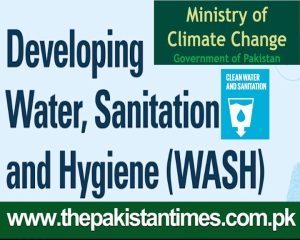
Ensuring that water, sanitation and hygiene (WASH) infrastructure and services are sustainable, safe and resilient to the impacts of climate change is essential to help communities Pakistan is climate resilient. Strengthening the climate resilience of the country’s WASH sector is therefore critical to achieving other UN Sustainable Goals, including Goal 3 (good health and well-being), Goal 4 (quality education), Goal 6 (clean water and sanitation), Goal 8 (decent jobs and economic growth) and Goal 13 (climate change), Muhammad Saleem Shaikh, developer said the statement from the Ministry of Climate Change and Environmental Coordination.
However comprehensive efforts are being made at all levels to make the country WASH-related facilities climate resilient to ensure sustainable delivery of sanitation services.” sanitation and public drinking water, especially in adverse situations of disasters,” declared the head of the Ministry.
The ministry official, who is also involved in public awareness and advocacy programs and activities for the climate-resilient WASH sector in Pakistan, said the climate impact is already being felt everywhere, most seriously in resource-poor developing countries, especially Pakistan. Nepal and Bangladesh.What’s amazing is that these devastating impacts are felt on the water in the form of unpredictable rainfall, melting glaciers, shrinking ice sheets, rising sea levels, reduced groundwater supplies, flooding and drought.
In other situations, increased water demand due to low rainfall can cause water sources (including wells and streams) to dry up. Conversely, heavy rains and flooding, such as recent urban flooding in flood-prone cities such as Karachi, Lahore and Rawalpindi, can damage water sources and sanitation facilities, leading to runoff. spills and waste into rivers, streams, lakes and pollutes water sources.
Ministry spokesman Muhammad Saleem emphasized Climate change-induced water shortages and the resulting rising water costs could exacerbate problems of inequitable access to water resources. WASH-related public services, subject people to various negative health impacts. Because water shortages and damage to WASH infrastructure often deprive households of the opportunity to get enough drinking water, meet hygiene needs, properly wash hands, and especially limit children’s ability to grow up healthy. .He said addressing these challenges to make the country WASH sector climate resilient is a daunting task and called for well-coordinated and steadfast efforts by all relevant stakeholders at the relevant level. state and provincial levels as well as people with expertise in this field. Identifying climate threats to WASH infrastructure, services and communities is a key adaptation measure, the official added.
However, the Ministry has engaged and coordinated with all stakeholders, including Unicef, Water aid Pakistan and other NGO not only to identify risks from climate change cause for WASH services but also to develop evidence-based solutions to address it. The devastating impact of climate change on the country’s infrastructure and WASH facilities. So, water, sanitation and hygiene services were not interrupted.
Citing a Unicef report, the ministry official added that about 450 million children live in areas marked as highly vulnerable to water or extremely vulnerable to water, where a very large number of children do not have enough water to meet their daily drinking, hygiene and sanitation needs. toilet.
By 2040, nearly a quarter of children will live in areas with extremely high water stress, he added, citing figures from reports. “Thus, when disasters strike, they can destroy or contaminate entire water supplies in areas with high or extremely high water vulnerability, further increasing the risk risk of water-borne diseases, mainly diarrhea, cholera and typhoid, especially children vulnerable.
Sub Editor: Nosheen Raja